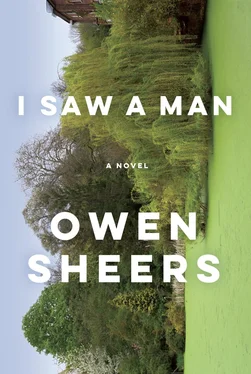In comparison, Josh had neglected their own garden over those same summer months. He’d wanted to hire someone in to take care of it, but Sam kept saying she’d prefer to do it herself one day. It was the same when Michael offered to help. She had a vision of her and the girls setting out with trowels and packets of seeds. But it never happened. So over that heat wave their flowerbeds and herbaceous borders suffered. The lawn yellowed, and its earth, whenever Josh picked it up, crumbled dry in his hands.
It was one of the first questions DS Slater had asked Josh the afternoon of Lucy’s death. “The soil on the landing,” she’d said, as they’d sat in that windowless room in the police station. “And on the floor in the bathroom. Had you been in the garden?”
He’d said no. Because he already had his story. He could already see, in his mind’s eye, where he’d been. He’d already rehearsed it so that now, for him, it was real. He’d been reading the paper in the conservatory. He’d had the radio on. But not so loud that he didn’t hear, when…
“Had anyone else been in the garden?” Slater asked. Her pursuit of the question frightened him. So he’d lied again. Rachel, maybe, he said. Yes, now that he thought of it, Rachel had been playing in the garden that morning. And he’d been out there himself, too, just the evening before. That, at least was true. So that’s where it had probably come from. From him or from Rachel. DS Slater had nodded, written in her notebook, and then moved on to her next inquiry.
After he and Samantha returned to the house that evening Josh had gone into the bathroom to shower. As he did he’d examined the carpet on the landing to see what Slater had been talking about. He had to get down on his knees to see it; it was barely soil at all, just a few motes of earth. Brushing them away, he’d stood up and forgotten about it. Any of them could have brought it into the house, at any time over the last few days. The same was true of the marks on the bathroom floor. And right then, with Rachel still oblivious to her younger sister’s death, with Samantha crying into her hands in the kitchen downstairs, and with Maddy bearing a knowledge that could sink him, Josh had put it out of his mind.
But on that evening when he’d spoken to Michael over the hedge, as he’d watched his neighbour stand from his freshly watered beds and brush his hands clean, Josh had remembered that soil again. Not just because it had been there, but because whenever it had fallen to the carpet it had been damp, not dry. By the time he’d returned from the police station it was like dust. But the marks it had made when first deposited — tiny smears across individual strands of fabric — suggested it hadn’t always been. The earth in his own garden hadn’t been watered for days. Which could mean only one thing. The soil on the landing had come from someone else’s.
So this was the other reason Josh had asked the letting agent to find him a flat close to South Hill Drive. Because although he couldn’t alert anyone, having claimed to have been in the house himself, and although he had no other proof than those crumbs of once-damp soil, he no longer trusted Michael. The man, Josh came to realise, as he smoked each night at his open Velux windows, as he looked over the rooftops, aerials, and satellite dishes of his neighbours, was a storyteller. By trade and by inclination. A loner when they’d first met him. A loner who, from what he could tell, had gathered few other friends since. A loner they’d welcomed into their home. But who was he, really? Beyond his books and his tales of other people’s lives? Josh didn’t know. After all the hours of their walks and their jogs on the Heath. After all their conversations sitting on that bench on Parliament Hill. He still didn’t know. He’d been a chattering fool, he told himself. While he’d talked and talked, Michael had listened. It was what he did, he’d said so himself many times. An “immersion journalist,” that’s what he’d called himself, and it was what Tony had called him, too. “One of the best immersion journalists I’ve read.” At the time, despite his nodding and agreeing, Josh hadn’t understood what Tony was talking about. He’d been too wrapped up in his own life to notice, or to care. Tony seemed impressed by it, and Samantha excited by it. That had been enough. But now, unemployed, estranged from his wife, and grieving for his youngest daughter, Josh thought he did understand, and in a way that neither Tony nor Samantha ever had. Now he was living away from Rachel and Sam. Now that they were so vulnerable, and Michael, who’d arrived as their neighbour from nowhere, was still there, living beside them, Josh thought he understood all too well.
The idea of it, the wild possibilities spiralling in his mind, wouldn’t let go of him. Yes, he was to blame for leaving the house. But was someone else to blame for his daughter’s death? And was that someone Michael, their quiet, listening, watching neighbour? Because of these suspicions, Josh knew that for as long as Michael lived next door to his wife and daughter, then he must keep them close, too, also watching, also listening, waiting for when he might learn more about Michael’s intentions and where he’d really been on that hot Saturday in June.
“IT WAS JUST experimenting at first,” Samantha said, leafing through the prints in their box. “But after a while it became something else. A kind of meditation, I suppose. Certainly a routine.” She paused at one of them. It was taken in autumn, the pond skinned with fallen leaves. A single child, a boy in red Wellingtons, apparently alone, was looking at his reflection in the water. “And then they became something else again,” she said. “A kind of story.”
“It’s the accumulation,” Michael said, picking up the print and looking at it more closely. “It builds a narrative, whether we want to or not.”
It was an evening in January. Rachel had only just come home from school, but already the Heath beyond the kitchen windows was dark. A clear sky was discovering its stars, the lights of aeroplanes blinking above the city. The year was young, but London had already been covered by snow once since Christmas and, according to forecasts, would be again that night.
“I like that,” Samantha said, picking up her wine. “ A narrative of accumulation. I might steal that.”
Michael had been wrong about Samantha. Her promises had been for the keeping, not just the making. And in their keeping she’d grown, become more herself. They hadn’t, after all, been a vehicle of transition, but rather had become that transition, a change in her and her life.
“Why didn’t you show me these before?” Michael said, placing the print of the boy in red Wellingtons back in the box.
Samantha took it out again, slipping it back in its chronological order. “I don’t know,” she said, looking at the photographs as if for the first time. “I suppose I wanted to keep them mine. To discover what it was. Get some distance.” She looked up at him. “Isn’t that what you’re always saying? You need distance to see anything clearly? To become your own editor.”
She’d recently cut her hair shorter. She wore jeans now, more than dresses. Michael remembered something his bereavement counsellor once said — about how after a death men tend to change their place, women their appearance.
“And now you’ve got that distance?” Michael asked.
“I want to share them,” Samantha said proudly, with the assertiveness of a child. “I thought, fuck it, even if they aren’t any good, I want them to be out there. I want them to be looked at, otherwise there’s no point, is there? They’d only be half cooked.”
Читать дальше











